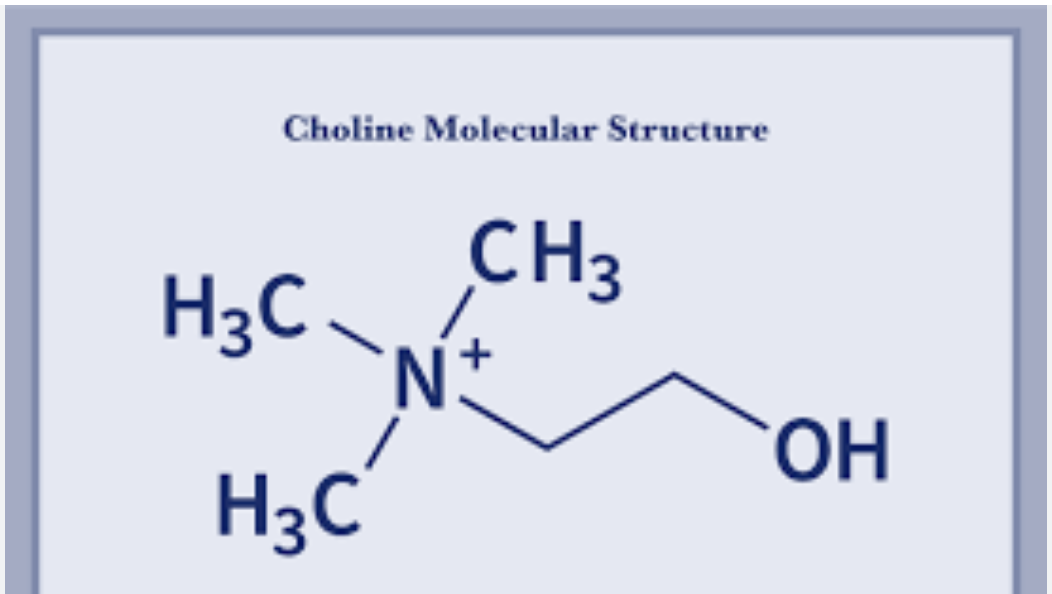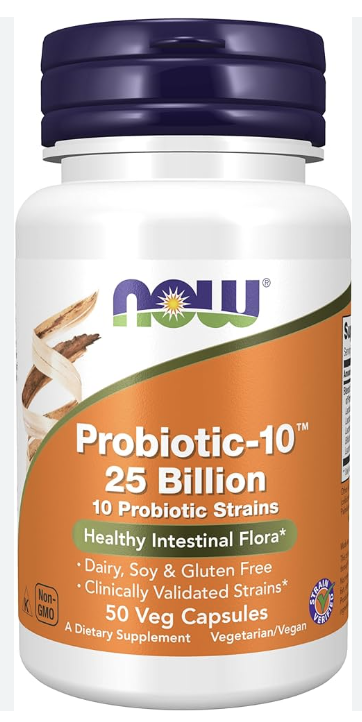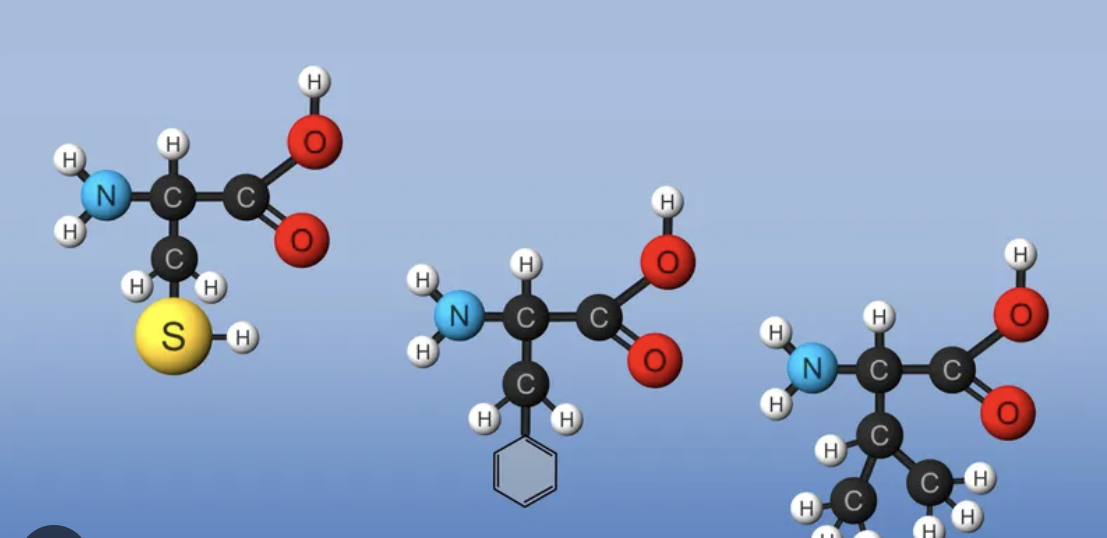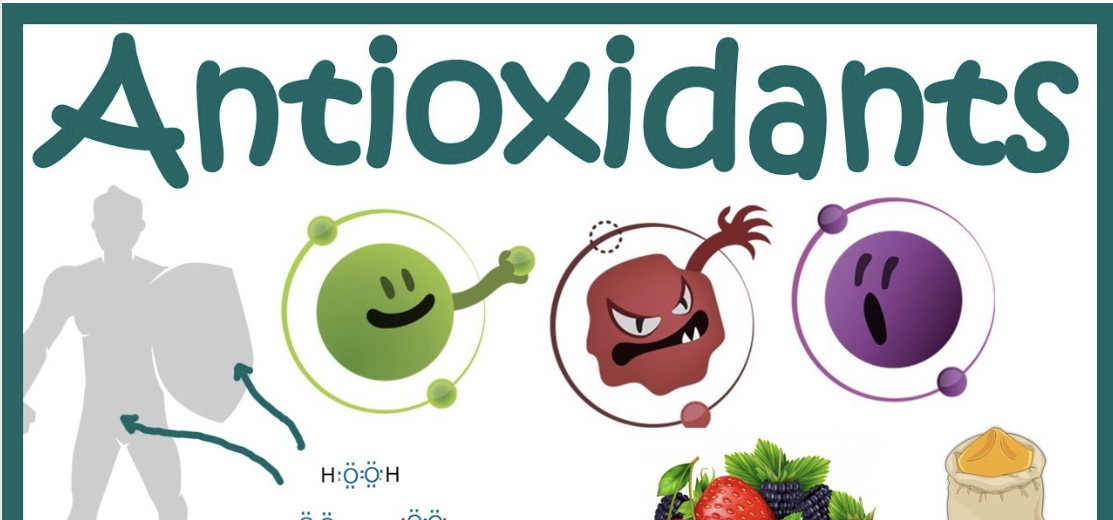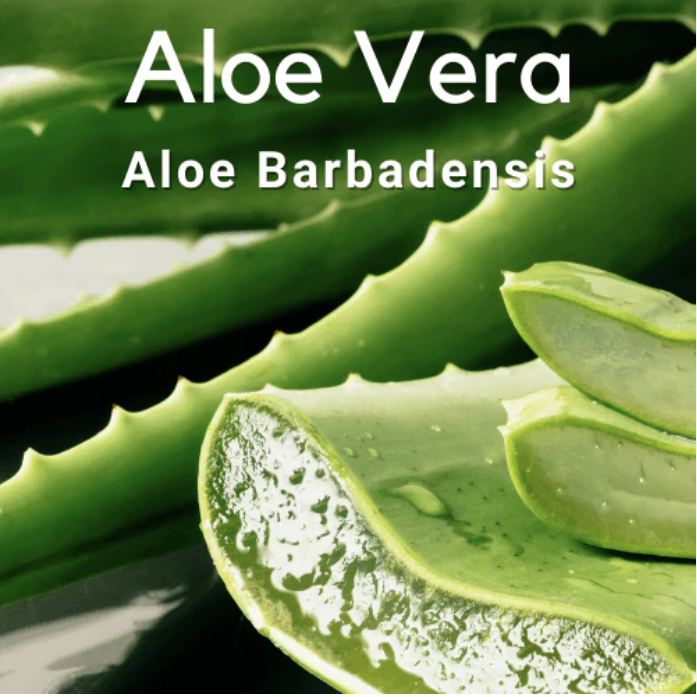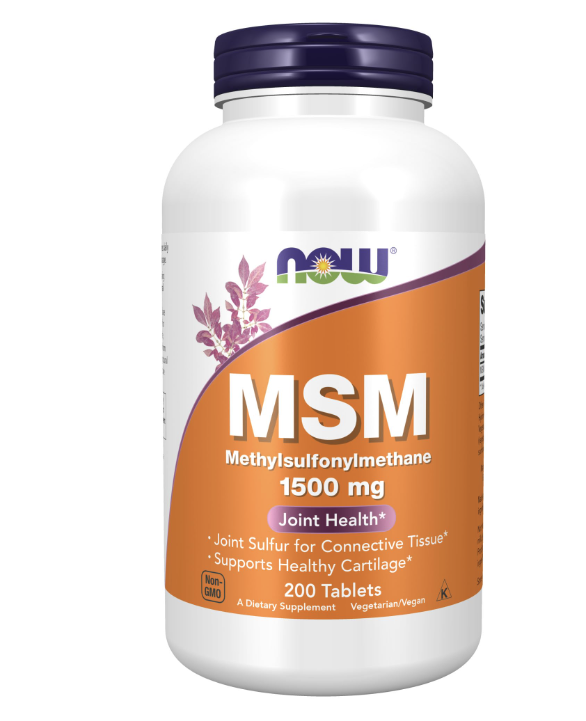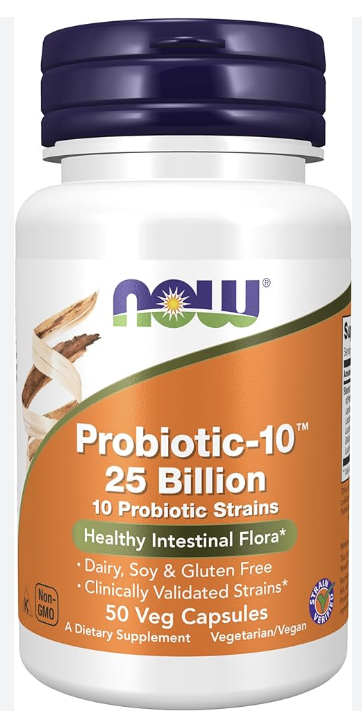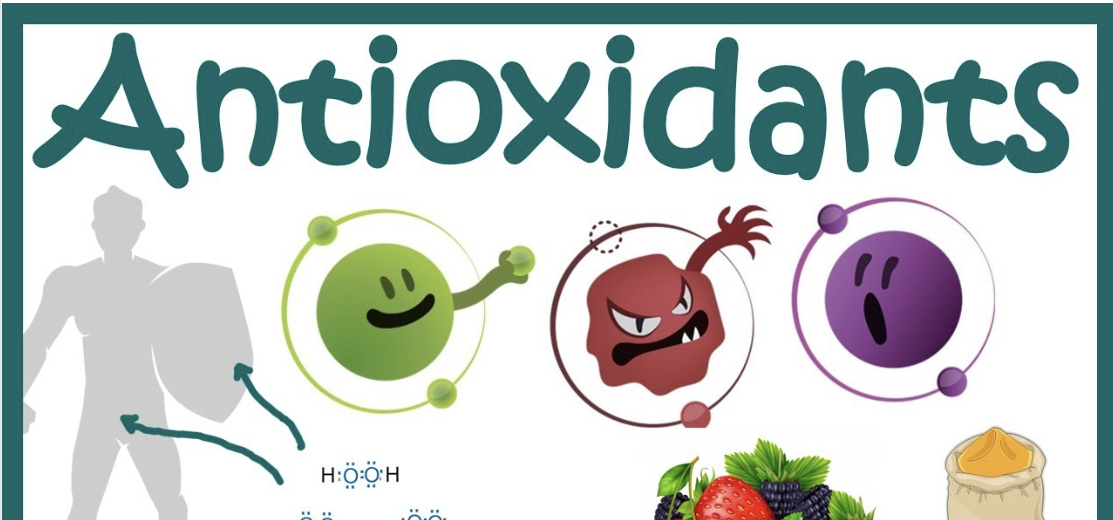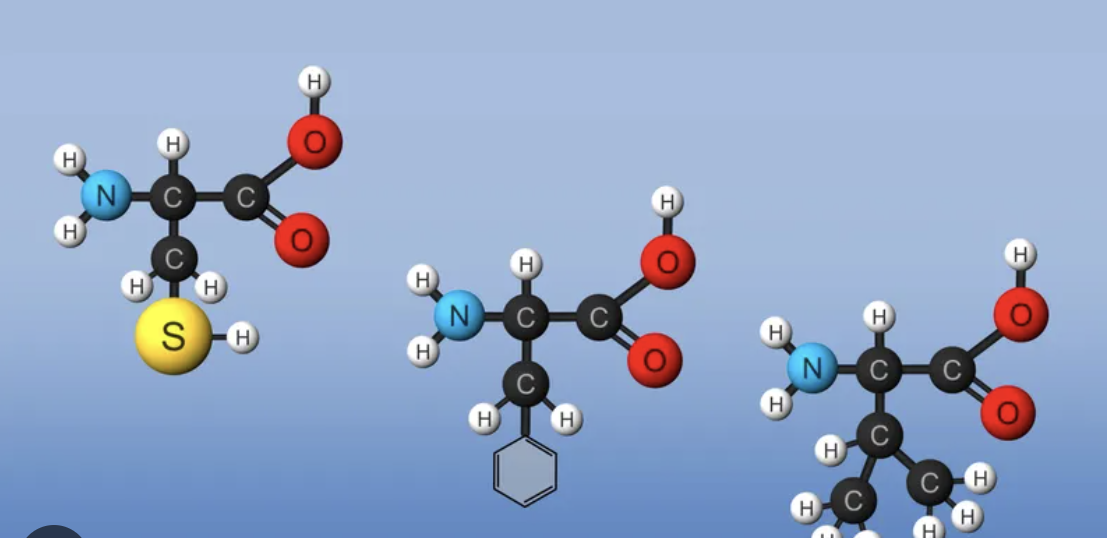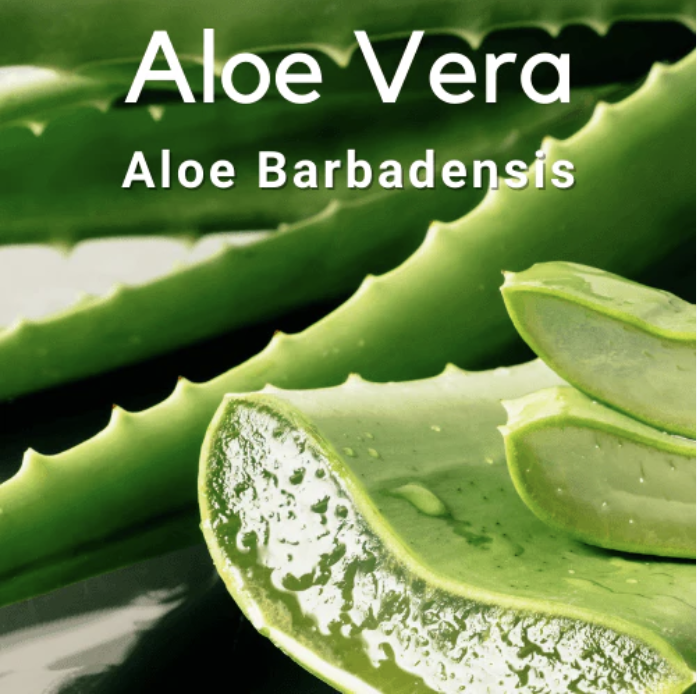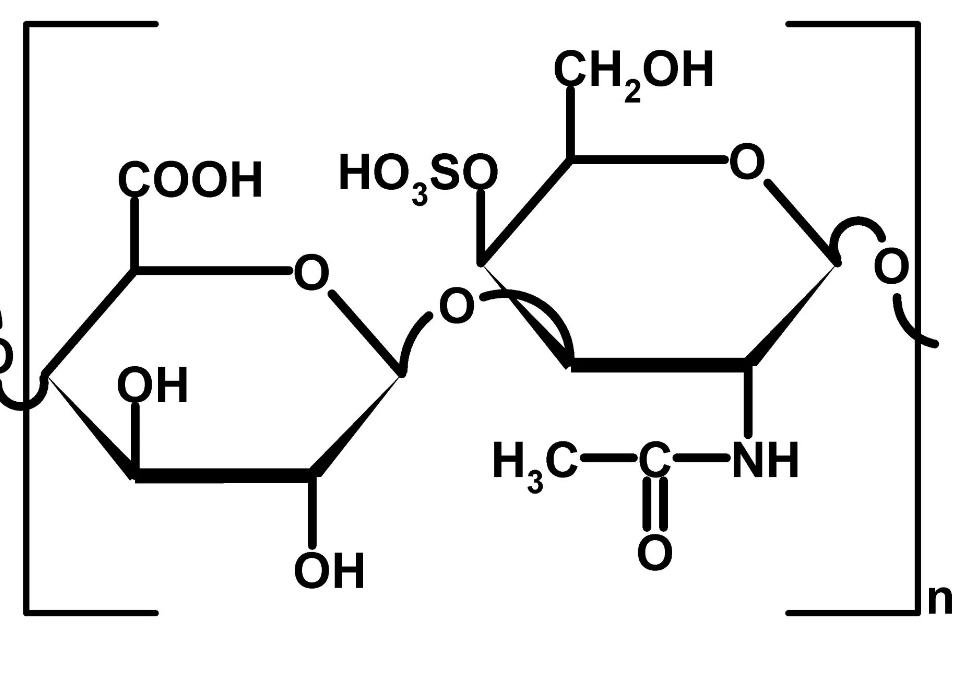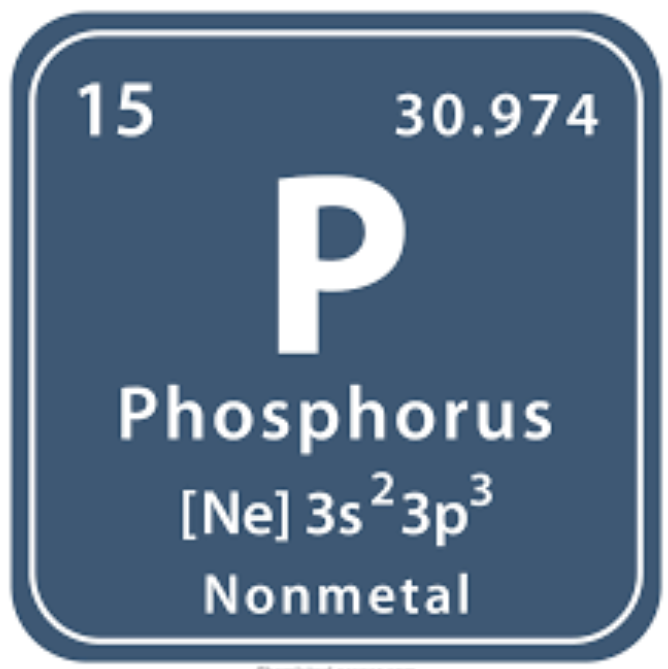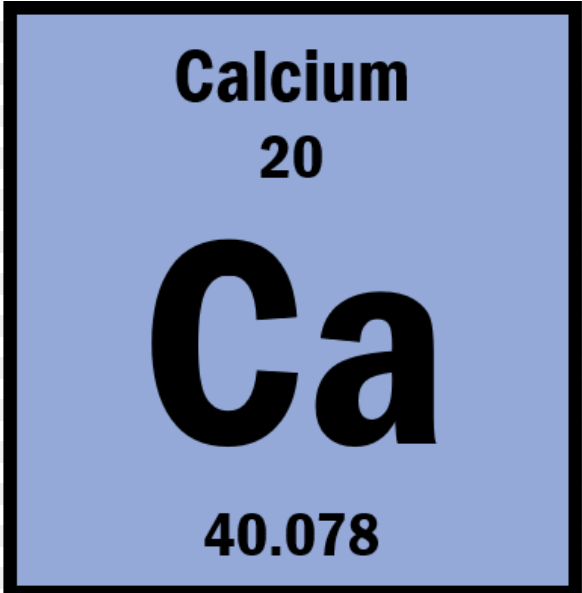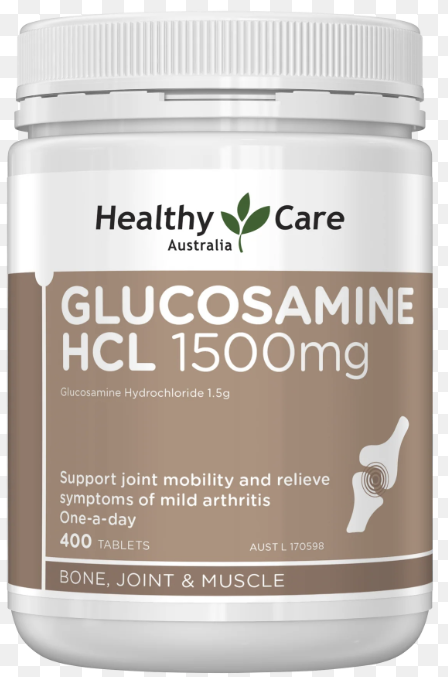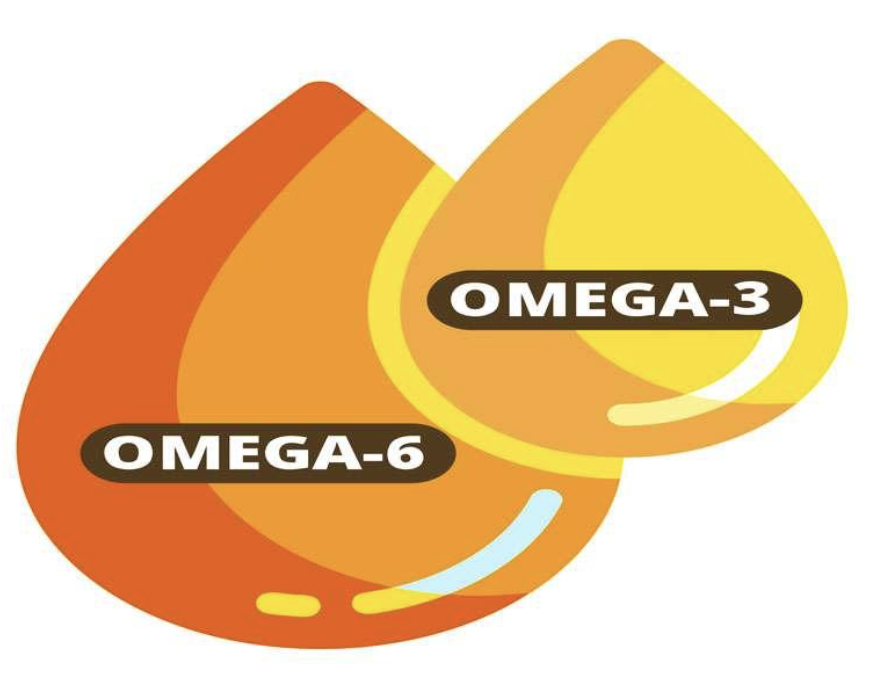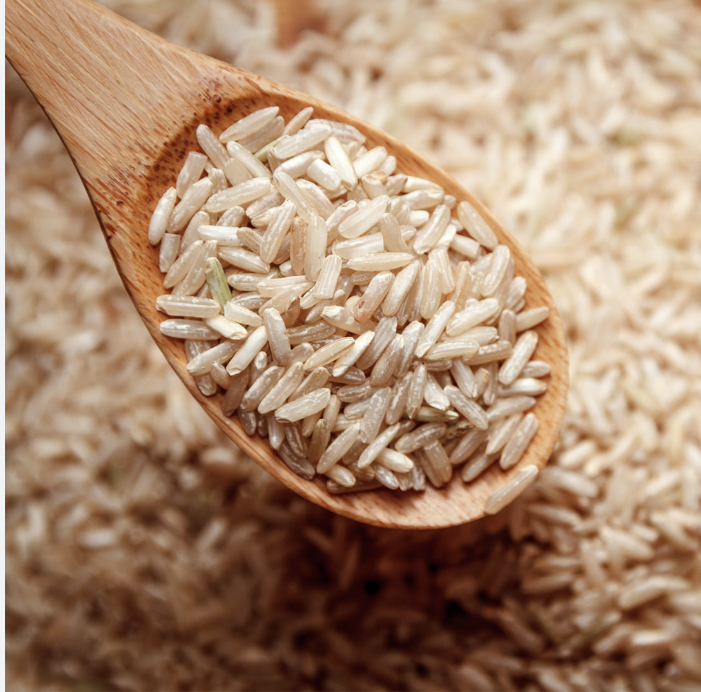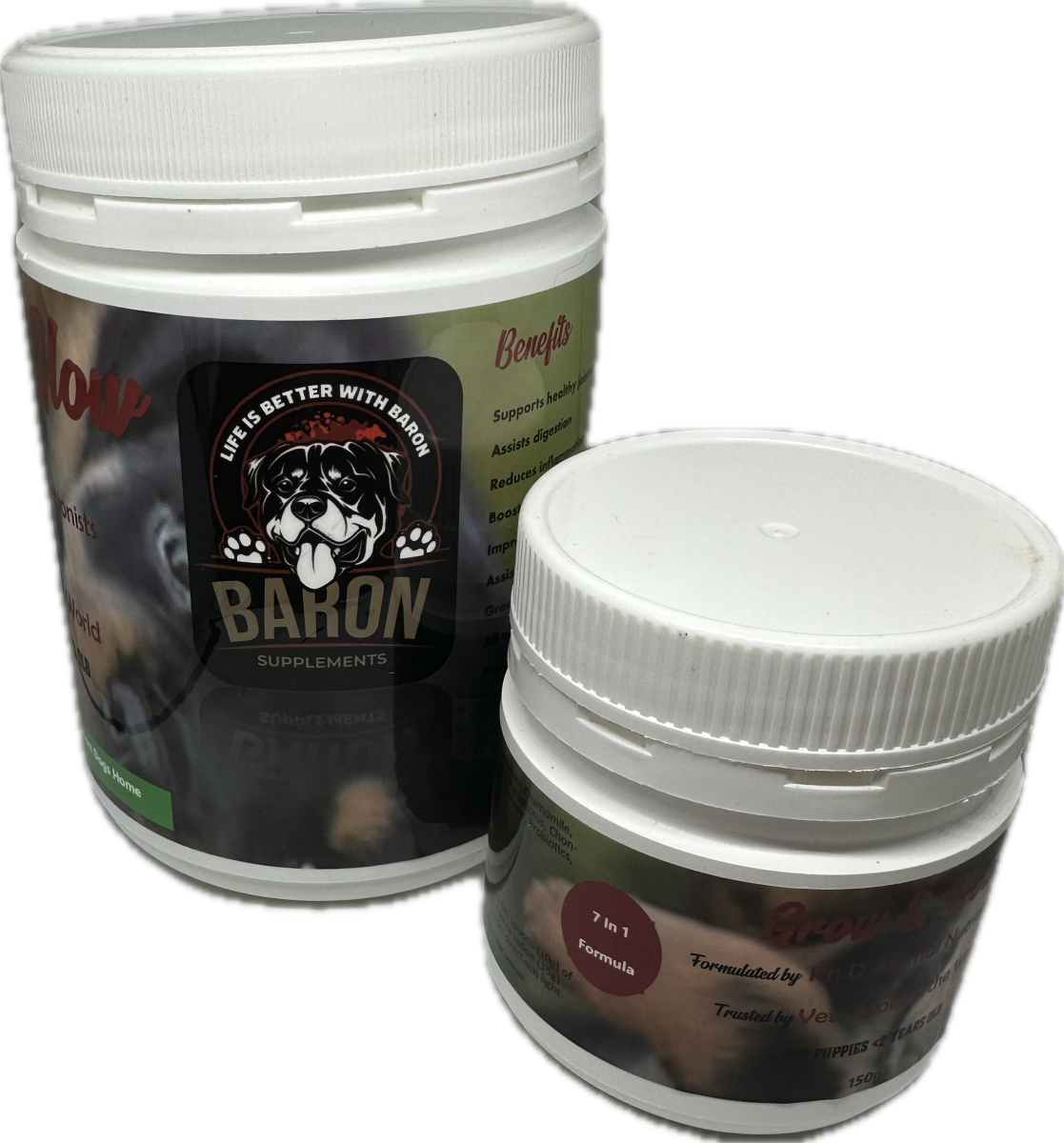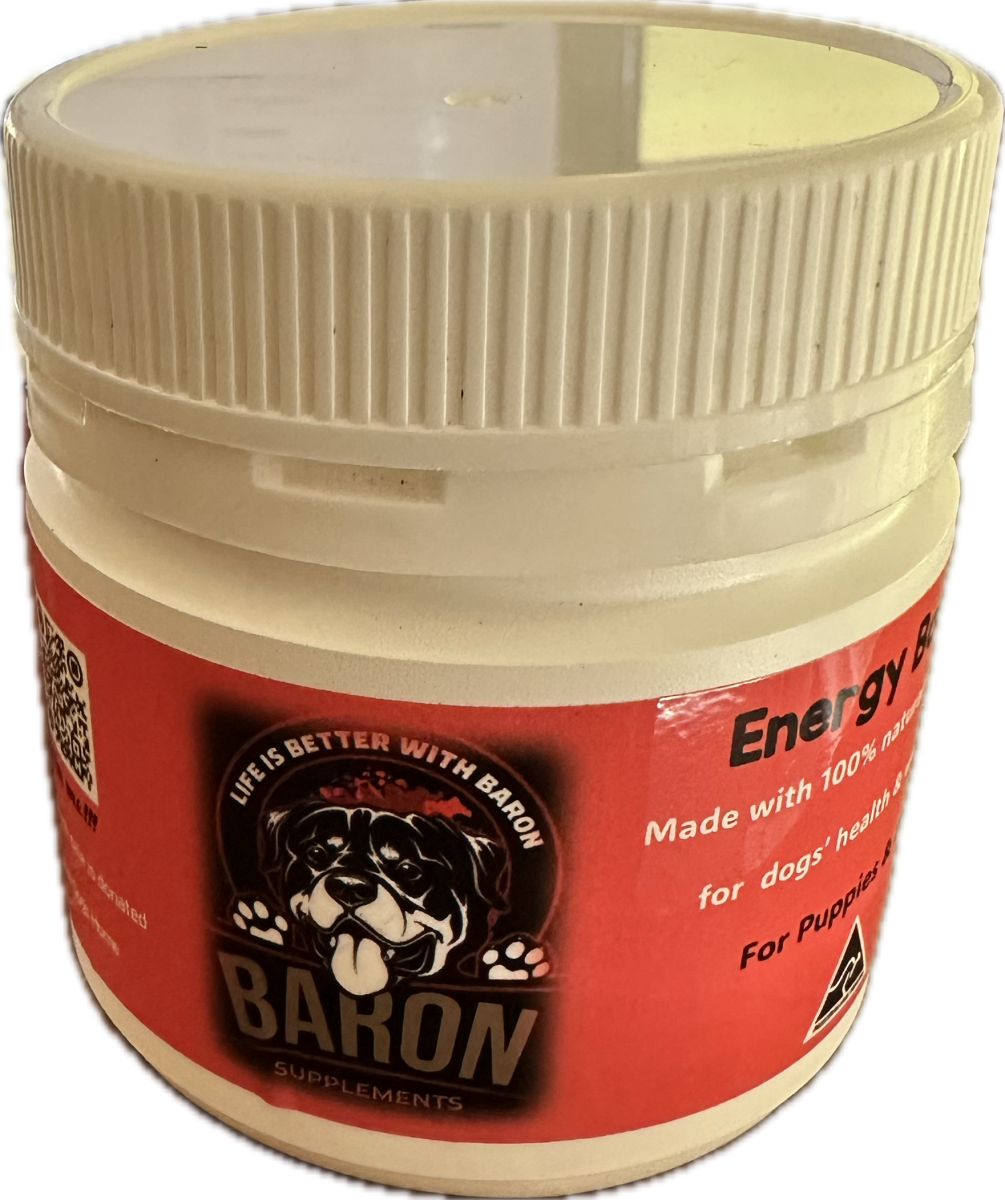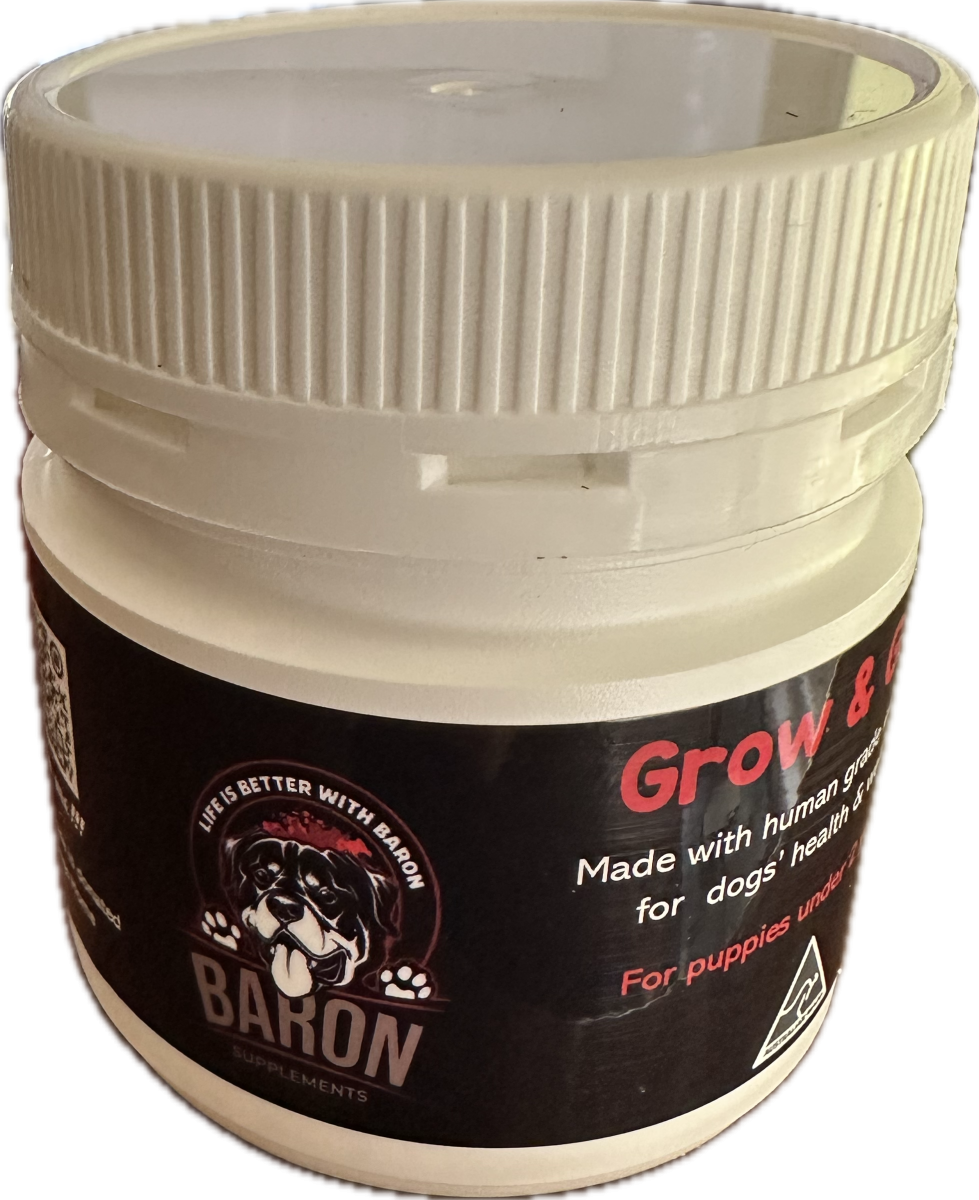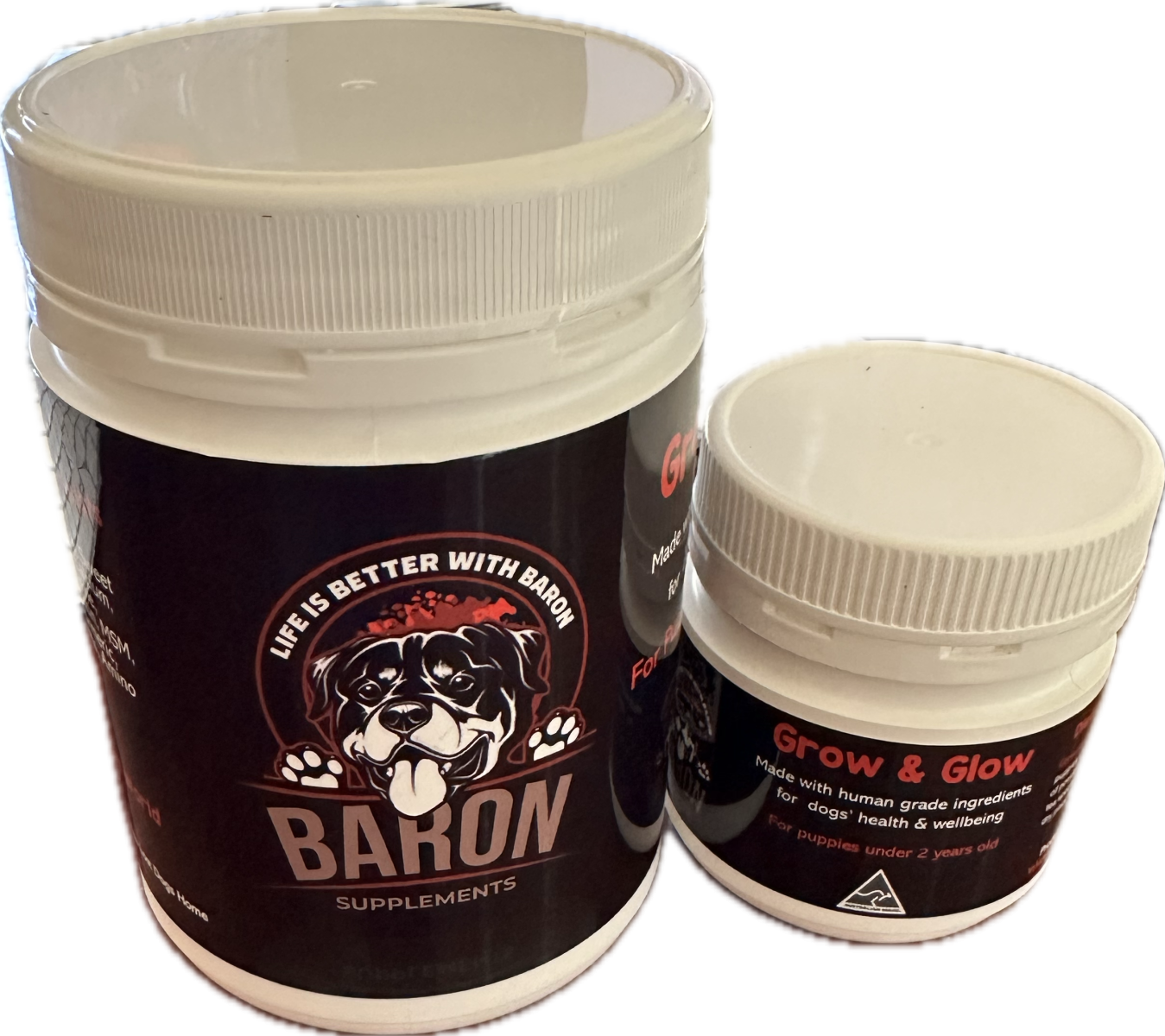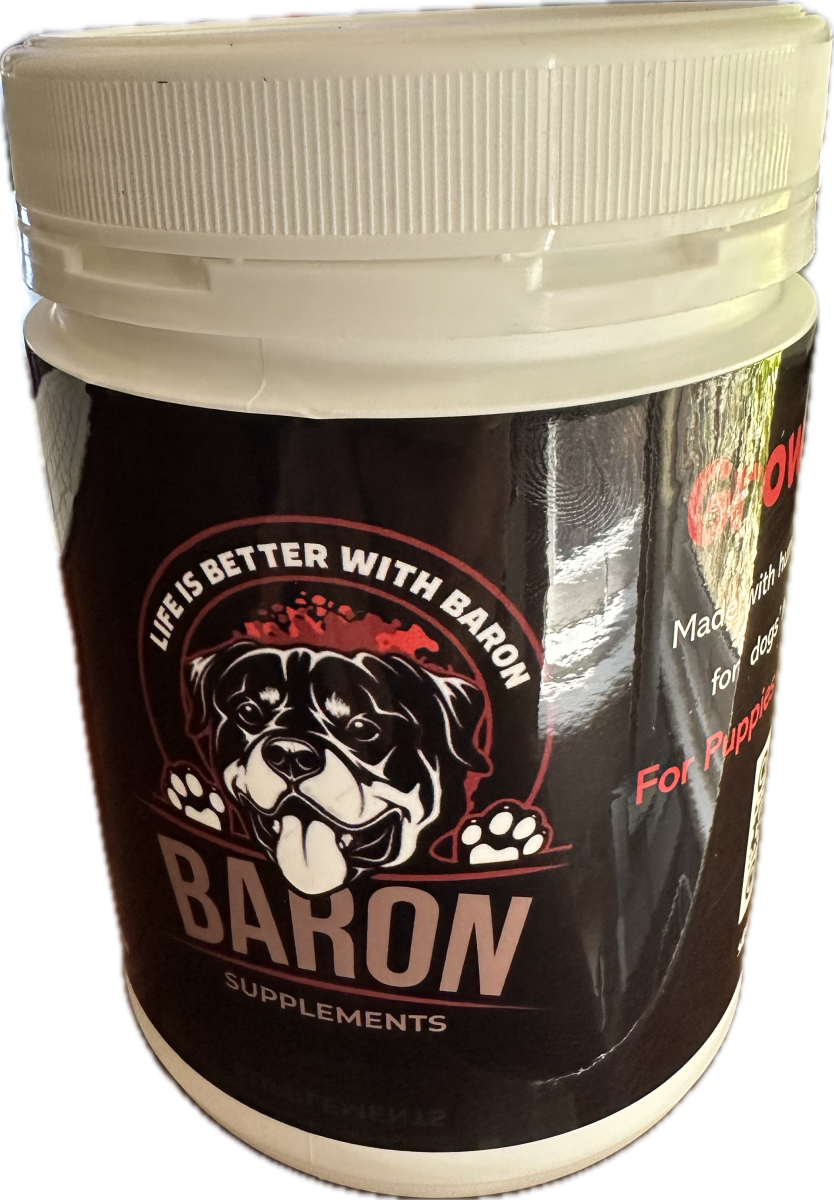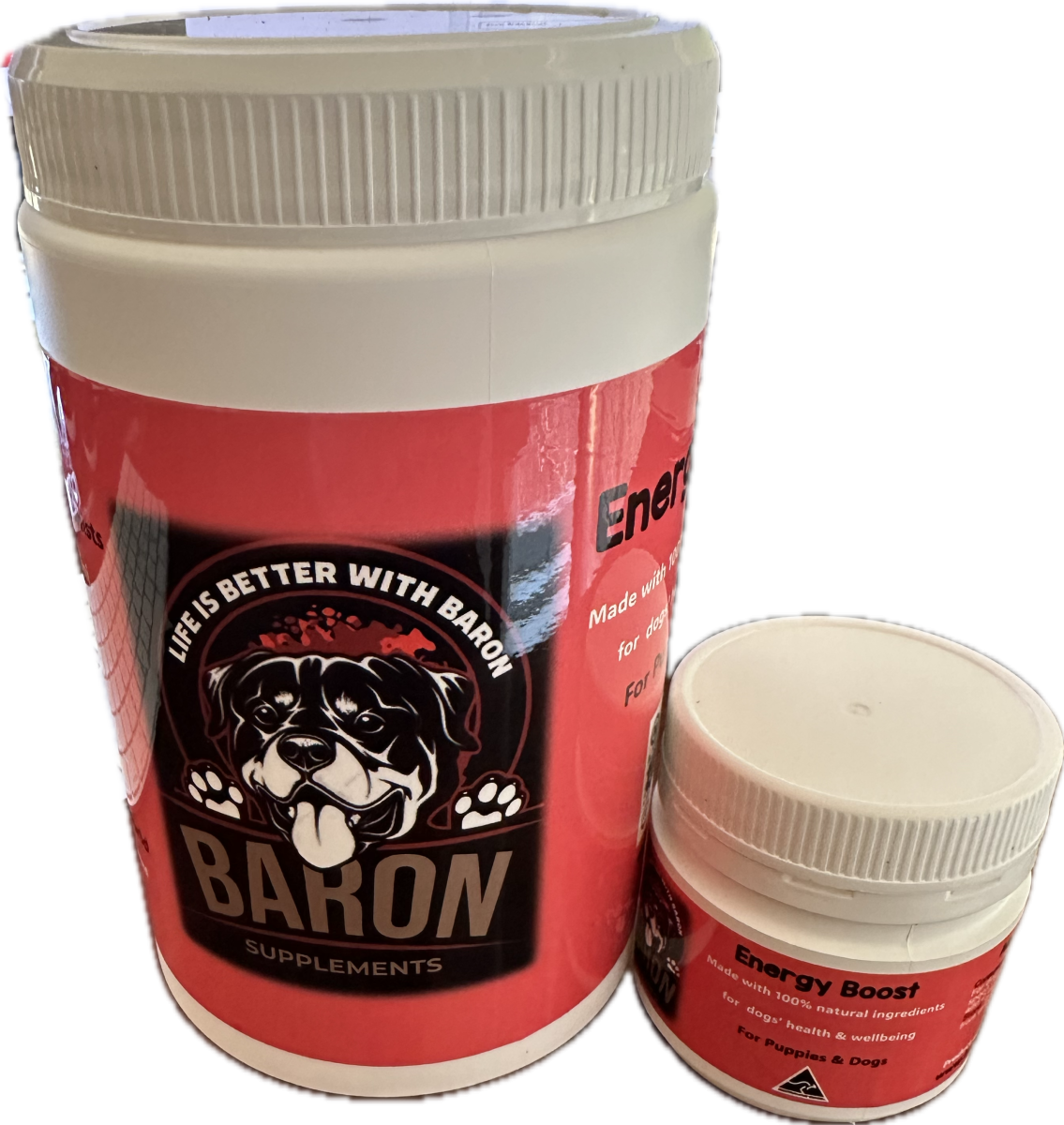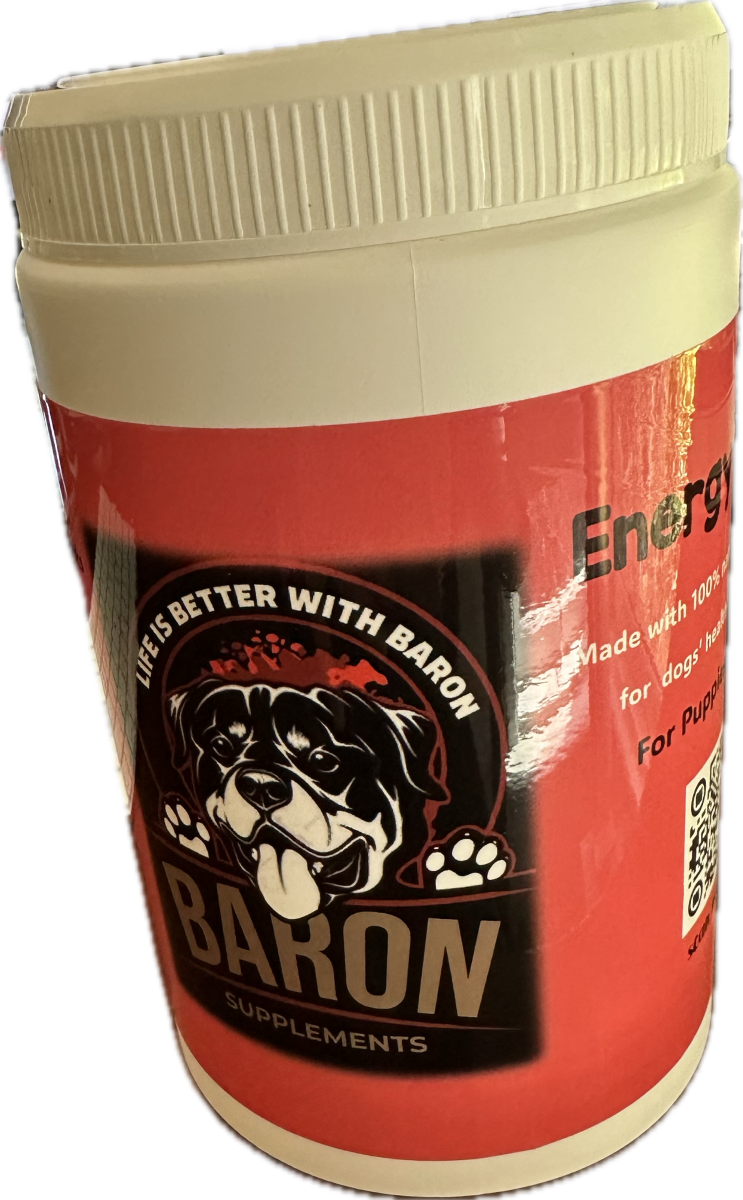Grow & Glow. Puppies range. The very core belief of Baron pet Supplements is that if you decided to bring a puppy into your life, then this puppy deserves the best of everything. Our Grow&Glow puppy supplement offers the best human grade ingredients to assist your puppy during developmental stage of his/her life.
Puppies Range Ingredients & Benefits
Nutrient Content: Brown rice is a whole grain that retains its outer bran layer, germ, and endosperm, providing essential nutrients such as fiber, vitamins, and minerals. These nutrients are important for the overall health and development of a growing puppy.
Digestive Health: The fiber in brown rice can aid in digestion and promote a healthy gastrointestinal tract. It can help regulate bowel movements and prevent constipation.
Energy Source: Brown rice is a complex carbohydrate, providing a slow-release source of energy. This can be beneficial for sustaining a puppy's energy levels throughout the day, supporting their active lifestyle and growth.
Blood Sugar Regulation: The complex carbohydrates in brown rice may contribute to better blood sugar regulation compared to simple carbohydrates found in some processed dog foods.
Weight Management: The fiber content in brown rice can contribute to a feeling of fullness, potentially aiding in weight management by preventing overeating.
Gluten-Free Option: Brown rice is naturally gluten-free, making it suitable for puppies with gluten sensitivities or allergies.
Rich in Nutrients: Sweet potatoes are a good source of essential nutrients such as vitamins A and C, potassium, and dietary fiber. These nutrients are crucial for a puppy's overall health, growth, and development.
Digestive Health: The fiber content in sweet potatoes can contribute to a healthy digestive system by promoting regular bowel movements and preventing constipation.
Energy Source: Sweet potatoes contain complex carbohydrates that provide a steady and sustained release of energy. This can be beneficial for active puppies, helping to support their energy needs throughout the day.
Vitamin A for Vision: Sweet potatoes are particularly high in beta-carotene, a precursor to vitamin A. Vitamin A is essential for maintaining good vision and supporting a healthy immune system.
Antioxidant Properties: The antioxidants in sweet potatoes, including beta-carotene and vitamin C, help neutralize free radicals in the body. This can contribute to overall cellular health and reduce oxidative stress.
Low in Fat: Sweet potatoes are relatively low in fat, making them a good option for puppies that need to manage their weight.
Anti-Inflammatory Benefits: Sweet potatoes contain anti-inflammatory properties that may help reduce inflammation in the body, supporting joint health and overall well-being.
Calming Effects: Chamomile is often praised for its calming and mild sedative effects. It may help soothe puppies in stressful situations, such as during thunderstorms, car rides, or visits to the veterinarian.
Digestive Aid: Chamomile is believed to have mild anti-inflammatory properties and may help soothe the digestive tract. It could be used to ease occasional digestive upset or mild gastrointestinal discomfort in puppies.
Anti-Inflammatory Properties: Chamomile contains compounds that may have anti-inflammatory effects, potentially aiding in the reduction of inflammation associated with certain skin conditions or minor irritations.
Mild Analgesic (Pain-Relieving) Effects: Chamomile may have mild analgesic properties, which could be beneficial for puppies experiencing mild pain or discomfort.
Antioxidant Properties: Chamomile contains antioxidants that can help neutralize free radicals in the body, contributing to overall health and well-being.
Support for Skin Conditions: Due to its anti-inflammatory and soothing properties, chamomile may be used topically or as a bath additive to help alleviate skin irritations or mild skin conditions in puppies.
Bone Development: Calcium is a primary component of bones and teeth. In growing puppies, an adequate supply of calcium is essential for the proper development and mineralization of the skeletal system.
Teeth Formation: Along with phosphorus, calcium plays a vital role in the formation and maintenance of healthy teeth in puppies.
Muscle Contraction: Calcium is involved in the process of muscle contraction. Adequate calcium levels help ensure proper muscle function, including the contraction and relaxation of muscles.
Blood Clotting: Calcium is essential for blood clotting. It plays a crucial role in the coagulation process, helping to prevent excessive bleeding in case of injury.
Nerve Function: Calcium is involved in nerve transmission and helps regulate the electrical impulses that travel along nerve cells. This is important for normal neurological function in puppies.
Cell Function: Calcium is a key regulator of various cellular processes. It is involved in cell signaling, enzyme activation, and the maintenance of cell structure.
Metabolic Processes: Calcium is essential for several metabolic processes in the body. It participates in the activation of various enzymes that are involved in energy metabolism.
Heart Health: Adequate calcium levels are crucial for maintaining the proper functioning of the heart. Calcium is involved in the contraction of the cardiac muscles, supporting a healthy cardiovascular system.
Brain Development: Omega-3 fatty acids, particularly DHA (docosahexaenoic acid), are essential for the development of the nervous system and brain. Adequate DHA intake during the puppy's early developmental stages supports cognitive function and learning.
Eye Health: DHA, an omega-3 fatty acid, is a major component of the retina. It contributes to the development and maintenance of healthy eyesight in puppies.
Healthy Skin: Both omega-3 and omega-6 fatty acids play a role in maintaining healthy skin. They help promote a shiny coat, reduce dryness, and minimize skin irritations in puppies.
Joint Health: Omega-3 fatty acids, especially EPA (eicosapentaenoic acid) and DHA, have anti-inflammatory properties that can help support joint health and reduce inflammation associated with conditions like arthritis.
Immune System Support: Omega-3 and omega-6 fatty acids contribute to a well-functioning immune system. They help regulate immune responses and promote overall immune health in puppies.
Anti-Inflammatory Effects: Omega-3 fatty acids, in particular, have anti-inflammatory properties that can be beneficial in managing inflammation associated with various health conditions, including skin issues and joint problems.
Cardiovascular Health: Omega-3 fatty acids, such as EPA and DHA, support cardiovascular health by helping regulate blood clotting, reducing blood pressure, and supporting overall heart function in puppies.
Anti-Aging Benefits: The anti-inflammatory and antioxidant properties of omega-3 fatty acids may contribute to slowing down the aging process and promoting overall longevity in puppies.
Joint Health: Glucosamine is a key component of cartilage, which is the tissue that cushions the joints. Supplementing with glucosamine may support the maintenance and repair of joint cartilage, promoting overall joint health in puppies.
Osteoarthritis Support: Glucosamine is commonly used in dogs, including puppies, to manage symptoms of osteoarthritis. It may help reduce joint pain and stiffness associated with this condition.
Joint Lubrication: Glucosamine can contribute to the production of synovial fluid, which lubricates the joints. Improved joint lubrication may enhance joint flexibility and reduce friction, particularly beneficial for active puppies.
Inflammation Reduction: Glucosamine has anti-inflammatory properties that may help reduce inflammation in the joints. This can be particularly useful for puppies experiencing joint discomfort due to inflammation.
Prevention of Joint Issues: Providing glucosamine early in a puppy's life may help support joint health and potentially reduce the risk of developing joint issues later in life.
Cartilage Maintenance: Glucosamine plays a role in maintaining the structural integrity of cartilage. Supporting healthy cartilage can contribute to the overall well-being of a puppy's joints.
Bone and Teeth Formation: Phosphorus is a major component of bone and tooth structure, working alongside calcium. Adequate phosphorus intake is essential for the proper development and mineralization of the skeletal system in growing puppies.
Energy Metabolism: Phosphorus is involved in various metabolic processes, including the production and transfer of energy within cells. It is a key component of ATP (adenosine triphosphate), the primary energy currency of cells.
Cellular Function: Phosphorus is a crucial component of nucleic acids (DNA and RNA), which are essential for cellular function and the transmission of genetic information. It plays a role in cell division, growth, and repair.
pH Balance: Phosphorus helps maintain the acid-base balance in the body, supporting the proper functioning of enzymes and other biochemical processes.
Kidney Function: Phosphorus is involved in kidney function and the excretion of waste products. Proper phosphorus levels are important for maintaining renal health in puppies.
Vitamin Utilization: Phosphorus is necessary for the proper utilization of various vitamins, including the B vitamins, which are important for energy metabolism and other physiological functions.
Nervous System Function: Phosphorus plays a role in nerve conduction and is essential for the proper functioning of the nervous system. It helps transmit nerve impulses and supports neurological health in puppies.
oint Cartilage Support: Chondroitin is a major component of cartilage, and it helps maintain the structural integrity of the cartilage tissue. This is particularly important for puppies during their growth and development, as it supports the health of their joints.
Joint Lubrication: Chondroitin aids in the production of synovial fluid, which lubricates the joints. Improved joint lubrication can enhance joint flexibility, reduce friction, and contribute to overall joint health in active puppies.
Inflammation Reduction: Chondroitin has anti-inflammatory properties that may help reduce inflammation in the joints. This can be beneficial for puppies experiencing joint discomfort due to inflammation.
Joint Function: Chondroitin contributes to the overall function of joints by promoting flexibility and ease of movement. It can be particularly helpful for puppies that engage in regular physical activities.
Osteoarthritis Management: Chondroitin is often used in combination with glucosamine to manage symptoms of osteoarthritis in puppies. Together, they may help alleviate joint pain and stiffness associated with this condition.
Joint Health Maintenance: Regular supplementation with chondroitin may contribute to the long-term maintenance of joint health in puppies, supporting their mobility and overall well-being.
Joint Health: MSM is often included in joint supplements due to its potential role in supporting joint health. It is believed to contribute to the formation and repair of connective tissues, including cartilage.
Anti-Inflammatory Properties: MSM has been suggested to have anti-inflammatory properties, which may help reduce inflammation in the joints. This could be particularly beneficial for puppies experiencing joint discomfort or inflammation.
Pain Relief: Some advocates of MSM suggest that it may have analgesic (pain-relieving) effects, potentially helping to alleviate joint pain in puppies, especially those with conditions like osteoarthritis.
Antioxidant Effects: MSM may act as an antioxidant, helping to neutralize free radicals in the body. Antioxidants play a role in reducing oxidative stress and promoting overall health.
Sulfur Source: MSM is a bioavailable source of sulfur, an essential component in various physiological processes. Sulfur is involved in the formation of proteins, enzymes, and other molecules necessary for the proper functioning of the body.
Improved Joint Flexibility: Some anecdotal reports suggest that MSM supplementation may contribute to improved joint flexibility in dogs, including puppies engaged in regular physical activities.
Brain Development: Choline is a crucial component in the formation of cell membranes and neurotransmitters in the brain. Adequate choline intake during puppyhood supports healthy brain development and cognitive function.
Cognitive Function: Choline is involved in the synthesis of acetylcholine, a neurotransmitter that plays a role in memory and learning. Sufficient choline levels may contribute to improved cognitive function in puppies.
Nervous System Health: Choline is essential for the proper functioning of the nervous system. It helps transmit nerve signals and supports the integrity of nerve cells.
Liver Health: Choline is important for the metabolism of fats in the liver. It helps prevent the accumulation of fat in the liver, contributing to overall liver health in puppies.
Cell Membrane Structure: Choline is a key component of phospholipids, which are essential for the structure and integrity of cell membranes. It plays a role in maintaining the health of cells throughout the body.
DNA Synthesis: Choline is involved in the synthesis of DNA and is crucial for cell division and growth. Adequate choline levels support proper development and growth in puppies.
Prevention of Neural Tube Defects: Choline is important for the development of the neural tube in puppies. Sufficient choline intake during gestation and early puppyhood can help prevent neural tube defects.
Anti-Inflammatory Effects: Some research suggests that choline may have anti-inflammatory properties, which can be beneficial in reducing inflammation and supporting overall health.
Skin Soothing: Aloe vera gel is known for its cooling and soothing properties, which can be beneficial for puppies with minor skin irritations, itching, or redness. It may be used topically to help alleviate discomfort associated with skin issues.
Wound Healing: Aloe vera is believed to have wound-healing properties. Applying aloe vera gel to minor cuts, scratches, or abrasions on a puppy's skin may help promote healing and reduce the risk of infection.
Sunburn Relief: The cooling effect of aloe vera can provide relief for puppies with mild sunburn. It's essential to ensure that the aloe vera product used is free from potentially harmful additives or preservatives.
Moisturizing: Aloe vera gel can serve as a natural moisturizer, which may be useful for puppies with dry or flaky skin. However, it's crucial to choose products specifically formulated for pets and avoid those containing added ingredients that could be toxic.
Insect Bite Relief: Aloe vera may help soothe the discomfort associated with insect bites. Applying a small amount of aloe vera gel to the affected area can provide relief.
Oral Health: In some cases, aloe vera gel is included in certain pet dental products to support oral health. However, the use of aloe vera in oral care should be under the guidance of a veterinarian, as ingestion of certain aloe vera products can be harmful.
Anti-Inflammatory Properties: Curcumin, the active ingredient in turmeric, is known for its anti-inflammatory properties. It may help reduce inflammation associated with various conditions, including joint issues, arthritis, and skin irritations.
Joint Health: Turmeric's anti-inflammatory effects may contribute to the management of joint pain and stiffness, making it potentially beneficial for puppies with conditions like osteoarthritis.
Antioxidant Effects: Curcumin has antioxidant properties, helping to neutralize free radicals in the body. This antioxidant activity may contribute to overall cellular health and support the immune system.
Digestive Health: Turmeric may have mild digestive benefits. It could help soothe the digestive tract, alleviate mild digestive discomfort, and contribute to overall gastrointestinal well-being in puppies.
Cognitive Function: Some studies suggest that curcumin may have neuroprotective properties, potentially supporting cognitive function. This could be beneficial for the overall brain health of puppies.
Antibacterial and Antifungal Properties: Turmeric has been studied for its potential antibacterial and antifungal effects. While more research is needed, these properties may contribute to skin health and the prevention of certain infections.
Digestive Health: Probiotics help maintain a healthy balance of gut microflora, promoting optimal digestion and nutrient absorption in puppies. They can aid in preventing or alleviating digestive issues such as diarrhea, constipation, and irritable bowel syndrome.
Immune System Support: A significant portion of the immune system is located in the gut. Probiotics contribute to a balanced immune response and may enhance the puppy's ability to fight off infections and illnesses.
Reduced Risk of Infections: Probiotics can help prevent the overgrowth of harmful bacteria in the gut, reducing the risk of bacterial infections. This is particularly beneficial for puppies that may be more susceptible to gastrointestinal issues.
Support for Antibiotic Treatment: Antibiotics can disrupt the balance of beneficial bacteria in the gut. Probiotics help restore this balance, reducing the likelihood of antibiotic-associated diarrhea and supporting overall recovery.
Allergy Management: Probiotics may play a role in managing allergies by modulating the immune response and promoting a balanced immune system. This could be beneficial for puppies with food sensitivities or environmental allergies.
Healthy Skin and Coat: A balanced gut microbiome can contribute to healthy skin and a shiny coat in puppies. Probiotics may help manage skin conditions and allergies that can affect the coat's appearance.
Reduced Stress Impact: Stress can negatively impact the gut microbiome. Probiotics may help puppies better cope with stress, whether it's due to changes in environment, travel, or other stressors.
Prevention of Bad Breath: Probiotics can contribute to improved oral health by promoting a healthy balance of bacteria in the mouth, potentially reducing bad breath in puppies.
Cellular Protection: Antioxidants neutralize free radicals, preventing them from causing damage to cells. This protection is important for the overall well-being of puppies, especially during the growth and development stages.
Immune System Support: Antioxidants, such as vitamins C and E, support the immune system by reducing oxidative stress and inflammation. A robust immune system is essential for puppies to fend off infections and diseases.
Skin and Coat Health: Antioxidants contribute to healthy skin and a shiny coat. They help protect the skin from oxidative damage, which can be particularly beneficial for puppies with skin conditions or allergies.
Eye Health: Antioxidants, including beta-carotene (a precursor to vitamin A), lutein, and zeaxanthin, support eye health by protecting against oxidative damage. This is important for maintaining good vision in puppies.
Joint Health: Some antioxidants, such as those found in fruits and vegetables, may have anti-inflammatory properties that can benefit joint health. This is particularly relevant for puppies, especially those prone to joint issues.
Cognitive Function: Antioxidants may play a role in maintaining cognitive function by protecting the brain from oxidative stress. This is important for supporting learning and memory in puppies.
Cardiovascular Health: Antioxidants can help maintain the health of the cardiovascular system by protecting blood vessels and reducing oxidative damage. This is beneficial for the overall cardiovascular well-being of puppies.
Reduced Aging Effects: While the aging process is natural, antioxidants may help reduce the effects of oxidative stress associated with aging. This can contribute to maintaining vitality and overall health in aging puppies.
Protein Synthesis: Amino acids are essential for the synthesis of proteins, which are fundamental for the growth and repair of tissues. Adequate protein intake, including essential amino acids, is crucial for a puppy's development, particularly during the rapid growth phases.
Muscle Development: Amino acids are vital for the development and maintenance of muscle tissue. They contribute to the formation of muscle proteins, supporting the puppy's overall muscle health and strength.
Bone Health: Amino acids, particularly those involved in collagen synthesis (such as glycine, proline, and lysine), play a role in the development and maintenance of healthy bones. This is crucial for the skeletal growth of puppies.
Enzyme Function: Amino acids are essential components of enzymes, which are catalysts for various biochemical reactions in the body. Enzymes facilitate processes like digestion, metabolism, and energy production.
Neurotransmitter Production: Certain amino acids, such as tryptophan and tyrosine, are precursors to neurotransmitters. These neurotransmitters play a role in the regulation of mood, behavior, and cognitive function in puppies.
Immune System Support: Amino acids contribute to the production of antibodies and other components of the immune system, helping puppies develop a robust defense against infections and diseases.
Energy Production: Some amino acids can be converted into glucose through a process called gluconeogenesis. This is important for providing energy, especially during periods of increased activity or fasting.
Healthy Coat and Skin: Amino acids, including those with sulfur-containing groups like methionine and cysteine, contribute to the formation of keratin, a protein that is crucial for healthy skin, coat, and nails in puppies.
Vision Health: Vitamin A is crucial for maintaining healthy vision. It is a component of the light-sensitive pigment rhodopsin, which is found in the retina of the eye. Adequate vitamin A helps support normal vision, especially in low-light conditions.
Immune System Support: Vitamin A is important for the proper functioning of the immune system. It plays a role in the development of white blood cells, which are essential for the body's defense against infections and diseases.
Skin and Coat Health: Vitamin A contributes to the health of the skin and coat. It plays a role in the maintenance of epithelial tissues, which are important for protecting the body from external pathogens.
Reproductive Health: Vitamin A is involved in the development and maintenance of reproductive tissues. It is essential for normal embryonic development and supports reproductive health in both males and females.
Cellular Growth and Differentiation: Vitamin A is necessary for cellular growth and differentiation. It plays a role in the development of various tissues and organs, contributing to the overall growth of the puppy.
Bone Growth: Vitamin A is involved in bone development and remodeling. It contributes to the maintenance of healthy bones and teeth in growing puppies.
Antioxidant Properties: Vitamin A has antioxidant properties that help neutralize free radicals in the body. This antioxidant activity contributes to overall cellular health and can protect cells from oxidative stress.
Mucous Membrane Health: Vitamin A supports the health of mucous membranes, including those lining the respiratory and digestive tracts. This is important for the integrity of these protective barriers.
Energy Metabolism: B-vitamins, including B1 (thiamine), B2 (riboflavin), B3 (niacin), B5 (pantothenic acid), B6 (pyridoxine), B7 (biotin), B9 (folate), and B12 (cobalamin), are involved in energy metabolism. They help convert food into energy that can be utilized by cells, tissues, and organs.
Nervous System Function: B-vitamins, particularly B1, B6, and B12, are essential for the proper functioning of the nervous system. They play a role in nerve impulse transmission, neurotransmitter synthesis, and the maintenance of nerve cells.
Red Blood Cell Formation: Vitamin B12 and folate (B9) are crucial for the formation of red blood cells. Adequate levels of these vitamins help prevent anemia and support overall blood health in puppies.
Protein Synthesis: B-vitamins contribute to the synthesis of proteins, which are essential for the growth, repair, and maintenance of tissues in puppies.
DNA and RNA Synthesis: B-vitamins, especially folate, play a role in the synthesis of DNA and RNA, supporting proper cell division and growth.
Immune System Support: Vitamin B6 is involved in the production of antibodies, which are vital components of the immune system. A well-functioning immune system is crucial for protecting puppies from infections and diseases.
Skin and Coat Health: B-vitamins contribute to the health of the skin and coat. Biotin, in particular, is known for its role in promoting healthy skin, fur, and nails in puppies.
Mental Development: Adequate levels of B-vitamins, especially folate, during gestation and early puppyhood are essential for proper brain and nervous system development.
Antioxidant Properties: Vitamin C is a powerful antioxidant that helps neutralize free radicals in the body. This antioxidant activity can protect cells and tissues from oxidative stress and damage.
Collagen Synthesis: Vitamin C is essential for the synthesis of collagen, a structural protein that is important for the formation and maintenance of connective tissues, skin, blood vessels, and bones. Collagen is crucial for the overall integrity and strength of various tissues in a puppy's body.
Immune System Support: Vitamin C plays a role in supporting the immune system. It helps stimulate the production and function of white blood cells, enhancing the body's ability to fight off infections and diseases.
Wound Healing: Vitamin C is involved in the healing process of wounds and injuries. It contributes to the formation of scar tissue and helps repair damaged tissues.
Iron Absorption: Vitamin C enhances the absorption of non-heme iron (iron from plant-based sources) in the digestive tract. This can be beneficial for puppies, especially if their diet includes plant-based sources of iron.
Antiviral Properties: Some studies suggest that vitamin C may have antiviral properties, potentially helping to reduce the severity and duration of certain viral infections.
Anti-Inflammatory Effects: Vitamin C has anti-inflammatory properties that may contribute to reducing inflammation in the body. This can be beneficial for puppies experiencing inflammation associated with various conditions.
Cognitive Function: Adequate levels of vitamin C may contribute to maintaining cognitive function and mental clarity in puppies.
Calcium and Phosphorus Absorption: Vitamin D is essential for the absorption of calcium and phosphorus in the intestines. These minerals are critical for the development and maintenance of strong bones and teeth in growing puppies.
Bone Development: Adequate levels of vitamin D are necessary for proper bone development. It helps regulate the balance of calcium and phosphorus in the bones, contributing to skeletal health.
Prevention of Rickets: Vitamin D deficiency can lead to conditions like rickets in puppies, which is characterized by weakened and deformed bones. Proper vitamin D intake is crucial for preventing such skeletal abnormalities.
Immune System Function: Vitamin D is involved in the functioning of the immune system. It helps regulate immune responses, and sufficient vitamin D levels are associated with better immune function in puppies.
Muscle Function: Vitamin D plays a role in muscle function and may contribute to the prevention of muscle weakness and abnormalities in puppies.
Cell Growth and Differentiation: Vitamin D is involved in cellular processes, including cell growth and differentiation. It plays a role in maintaining the structural integrity of various tissues and organs.
Hormone Regulation: Vitamin D functions as a hormone, influencing various physiological processes in the body. It is involved in the regulation of insulin, which is important for carbohydrate metabolism.
Mood Regulation: Some studies suggest that vitamin D may have a role in mood regulation and may influence behaviors. Adequate vitamin D levels may contribute to overall well-being in puppies.
Blood Clotting: Vitamin K is essential for the synthesis of proteins involved in blood clotting, particularly factors that help stop bleeding by forming clots. Adequate vitamin K is crucial to prevent excessive bleeding in case of injuries or surgeries.
Bone Health: Vitamin K contributes to bone health by regulating calcium within the bones and preventing excessive calcium buildup in soft tissues. It works synergistically with other vitamins and minerals, such as vitamin D and calcium, to support proper bone development and maintenance.
Cell Growth and Division: Vitamin K plays a role in cell growth and division. It is involved in the synthesis of proteins that contribute to the proper functioning of cells.
Cardiovascular Health: Some research suggests that vitamin K may have a role in supporting cardiovascular health by helping to prevent the calcification of arteries and maintaining vascular elasticity.
Anti-Inflammatory Effects: Vitamin K may have anti-inflammatory properties, contributing to the regulation of inflammation in the body. This can be beneficial for overall health, including joint health.
Product Range Benefits
There are numerous benefits of of Baron Pet Supplements product range. The most important goal of Baron pet Supplements is to provide our fur babies with best possible products to not only to prolong their time with us but also to make their lives as happy and as healthy as possible.
Individual needs of every pet vary greatly and depend on numerous factors. When developing our products, we had decided to focus on most common requirements for cats and dogs. Our product range addresses specific needs of different pets and different stages of lives. However the big picture remains the same. Major benefits of of Baron Pet Supplements are:
- Firstly, Nutritional Support
- Secondly, Joint Health
- Skin and Coat Health
- Digestive Health
- Immune System Support
- Dental Health
- Weight Management
- Brain Health
- Allergy Management
- Stress and Anxiety Relief
- Last but not least, Eye Health
Furthermore, our product range was developed by
PhD pet nutritionists and all our products were independently examined from numerous registered vets from around the world. We also continuously receive reviews by many happy clients who use our products.
